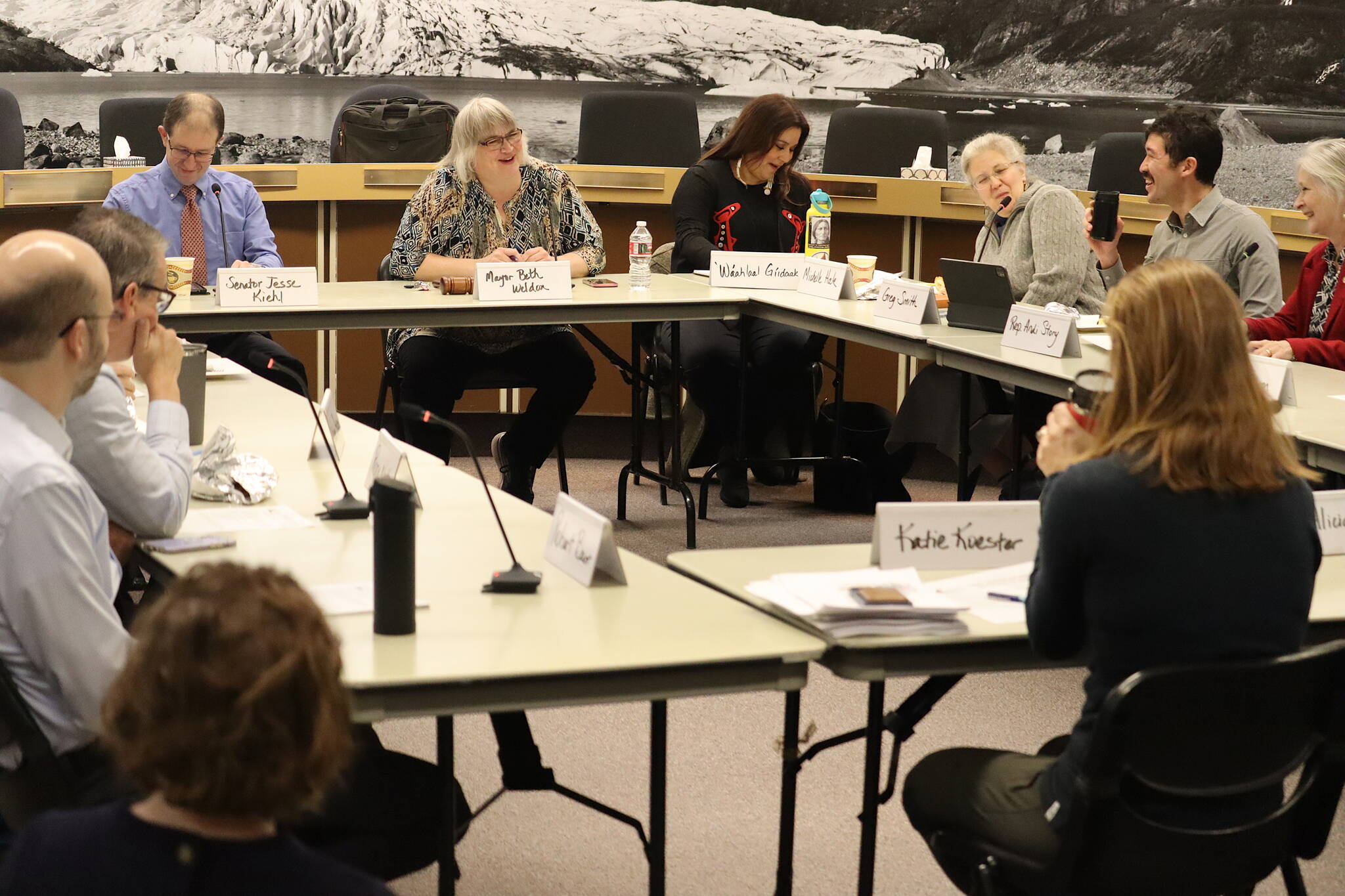Juneau’s local House members are in the minority, but at least the new majority seems open to boosting education spending. Republicans taking over the U.S. House may cause federal funding for local projects to hit snags, but Congress will be more likely to act this year than during the election melee in 2024. And while Juneau has lots of forest and kelp, it probably can’t copy the governor’s hopes of cashing in on carbon in a big way.
Those wide-ranging topics and many others were discussed during a two-hour “breakfast meeting” Thursday morning by the Juneau Assembly and city administrators, the three Democratic members of Juneau’s state legislative delegation and the city’s three lobbyists. Assembly members presented a list ranking more than 20 projects they’re seeking funds for, which the state lawmakers and two lobbyists working at federal level referred to as they discussed the political realities in their respective worlds.
The delegation also offered overviews of their priorities for the legislative session now in its second week, putting a heavy emphasis on various difficulties currently affecting residents working in Juneau and their families. At or near the top for all three legislators is increasing the base student formula that has remained unchanged for the past seven years and thus fallen far behind inflation, and reviving a pension plan for state employees that was eliminated many years ago.
“In the new House majority there are people that are really championing that and they are championing a return to a benefits option,” state Rep Andi Story said, adding “I just think there is nothing more crucial” than the latter issue because its a key element of keeping state educators and other employees in the area for the long-term instead of leaving after a few years.
Benefits were also cited by state Rep. Sara Hannan as part of a crucial issue when it comes to Alaska Marine Highway employees. She said she is trying to get the state’s transporation commissioner to understand how overall cutbacks and huge variances in seasonal services – especially cutting winter voyages so much there’s no work available – means employees lose their benefits.
“For most people with families that’s a critical part of your employee package,” she said.
Also needing an education in the realities of being a state employee are many of the 19 freshmen legislators, Hannan said. Among other things, she said some don’t realize state employees don’t get Social Security and thus need separate arrangement to obtain retirement benefits.
On the other hand, in response to a question from Assembly member Carole Triem about how the large freshman class might affect the city’s list of priority projects seeking state funds, Hannan said there is a silver lining.
“You have the opportunity to get people educated on an issue they know nothing about and set the framework,” she said.
State Sen. Jesse Kiehl, while agreeing educating new lawmakers is an opportunity, said even after more than 20 years at the Capitol as a legislator and staff member he can’t give a good answer yet to Triem’s question about local projects.
“I don’t know what the price of oil’s going to be, so I can’t tell you what the capital budget’s going to do,” he said.
Another potentially positive thing the large freshman class has done is significantly lower the average age of legislators, Story said.
“There is an attention on things that help working families” such as child care assistance, she said.
A handicap that comes with the local House members now in the minority — besides having a smaller staff — is bills they favor will now need to be carried by legislators in the majority to have a realistic chance of passage, Hannan said. She said she believes some of her main priorities, specifically singling out implementing a sales tax on e-cigarettes, should find support among those lawmakers.
Also discussed briefly was the suddenly high-profile issue of carbon credits, following Gov. Mike Dunleavy’s proposal to make them a revenue cornerstone for the state’s long-term financial future. Kevin Jardell, the city’s lobbyist for state matters, responded to an Assembly member question about the local potential for such income by noting it’s far more difficult since, for instance, Juneau doesn’t have the mineral rights to land that the state does.
All at the meeting agreed a major blessing to the state and city is the infusion of federal funds from the bipartisan infrastructure bill passed in 2021 and the omnibus budget bill approved at the end of last year.
Maximizing the use of those funds during the coming year will require ongoing efforts, which may be more difficult now that Congress is led by different parties in the House and Senate, said Dave Jansen, one of the city’s federal lobbyists. While all of Alaska’s congressional members are now in the minority of their chambers , Jansen noted there are leadership shifts such as Democratic Senator Patty Murray of Washington state now chairing the Appropriations Committee “which for this region is a very good thing.”
On a more general level, Jansen said the political mood in D.C. is likely to favor action sooner rather than later.
“2024 will probably be more political than anything else and members will want to get as much of their work done in 2023,” he said.
• Contact reporter Mark Sabbatini at mark.sabbatini@juneauempire.com

